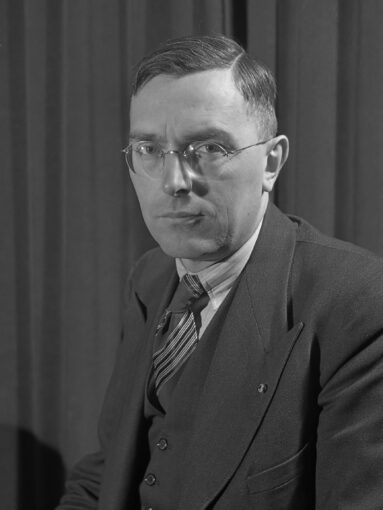
Max Euwe – Biography
Max Euwe was a Dutch chess player, the 5th official World Chess Champion (1935-1937), and President of FIDE (1970-1978).
He was born in Amsterdam on May 20th, 1901, in a teacher’s family. He learned to play at 4 years old from his parents, who were avid players. They even held friendly tournaments on a weekly basis.
Since childhood, Max demonstrated exceptional intellectual aptitude and learning ability. At school, he had a particular proclivity for math.
First Achievements
Young Euwe made swift progress. As a kid, he went to a youth club that normally only accepted members who were over 16. However, they made an exception for Max due to his abilities.
At 12, he got accepted into the adult chess club of Amsterdam. Only a couple of years later, Euwe starts to regularly compete in tournaments under the auspices of the Dutch Chess Federation.
At the age of 17, Max graduates from school and goes to University to get a degree in mathematics. Nevertheless, he continues to practice chess and reaches new milestones. First, he takes 2nd-3rd place at the Dutch Championship. Then, proceeds to defeat the world champion, Lasker, at a simul. Three years later, he wins the Dutch championship and continues to succeed at other international tournaments.
Despite his success, Euwe doesn’t abandon mathematics. In 1921, he passes his candidacy exam and graduates from the university in 1923. Shortly after, in 1926, he earns his doctorate.
In 1927, Euwe attends the World Chess Olympiad as a member of the Dutch national team. He plays as the team’s leader. In this tournament, the future champion scored 10.5 out of 15, losing only one game.
In 1933, Euwe becomes the champion of Holland yet again. After that, he sensationally announces the end of his chess career, hoping to dedicate more time to science and mathematics.
Max Euwe – The New Champion
But less than a year later, Euwe returned and challenged Alexander Alekhine, who held the Champion’s trophy at the time, to a chess battle.
The match took place in 1935 in Euwe’s homeland, the Netherlands. The opponents played a total of 30 games. Euwe was a clear outsider: he did not have nearly as many victories and achievements under his belt.
In the beginning, things were looking up for Alekhine. After 9 games, the score was 6-3. But in the 2nd half of the match, Euwe was able to get ahead and secure victory with a final score of 15.5 to 14.5. Chess enthusiasts generally believe that Alekhine lost because of his abuse of alcohol, tobacco, and an altogether careless lifestyle. Whatever the reasons, Euwe became the fifth person in history to earn the champion’s title in 1935.
Later events
Alekhine’s saving grace was the rematch planned for 1937. Prior to that, Euwe entrusted FIDE with the task of organizing the event. It was then that FIDE gained authority to make meaningful decisions.
The 1937 match was also held in the Netherlands, and the arrangement was practically identical. Only this time, it was the Dutchman who was the favorite. He started in the lead with 3-2 at the beginning of the match. But halfway through, Euwe’s performance dropped. As a result, the match ended prematurely after the 25th game. Alekhine won with a final score of 15.5 – 9.5.
After losing the title, Euwe continued to enter tournaments. However, during WWII, Max participated in only one competition.
After Alekhine’s death in 1946, five players competed for the champion’s title in a match tournament: Euwe, Botvinnik, Keres, Smyslov, and Reshevsky. In 1948, when it took place, Euwe ranked last.
After that, Euwe gradually steps away from playing chess on a regular basis. He participates in tournaments less often and holds fewer exhibitions.
Another highlight of Euwe’s life is becoming the president of FIDE in 1970 and 1974. He fervently promoted chess, resolved conflicts, and made informed decisions. Among other things, the 1972 legendary “match of the century” where Fisher challenged Spassky was largely a result of his efforts.
He died in 1981 of cardiac arrest at the age of 80.
Remarkable Legacy
Max Euwe went down in history not only as the 5th-ever champion of the intellectual sport, but also as a chess theoretician, mathematician, and president of the highly regarded international chess organization. He devoted his life to chess and did everything he could to help the game prosper.

